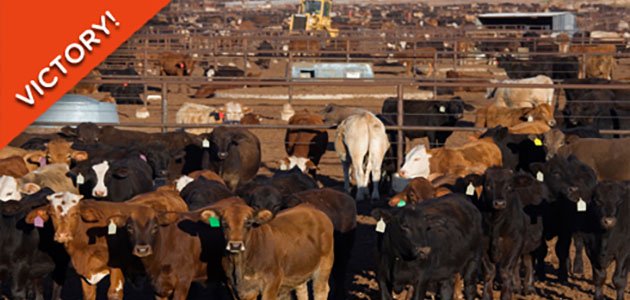Big Win for Animal Lovers: Judge Strikes Down Ag Gag Law in Idaho

Activists who try to film animal abuse on Big Ag farms often face a fine of up to $5000 for whistleblowing on the industry. But just a few short weeks ago, a federal judge ruled that Idaho’s controversial ‘ag gag’ law was unconstitutional, and said that criminalizing undercover documentation violates both free speech and the equal protection clauses of the constitution.
U.S. District Judge B. Lynn Winmill made his decision crystal clear in a 28-page ruling:
“The facts show the state’s purpose in enacting the statute was to protect industrial animal agriculture by silencing its critics.”
He outlined numerous ways the ag-gag law hurts not only the animals in question, but others on multiple levels of the food supply chain:
“The effect of the statute will be to suppress speech by undercover investigators and whistleblowers concerning topics of great public importance: the safety of the public food supply, the safety of agricultural workers, the treatment and health of farm animals, and the impact of business activities on the environment.”
Though those who are caught videotaping undercover currently face a fine of up to $5000 with the ag-gag law as it stands, a jail sentence for an animal cruelty conviction is capped at six months and a maximum fine of $5,000. Before this ruling, there was a very clear protection of the industry over individuals worried about animal rights.
Winmill seemed to understand just how important a video of abusive situations can be when someone comes forward with a concern:
“Audio and visual evidence is a uniquely persuasive means of conveying a message, and it can vindicate an undercover investigator or whistleblower who is otherwise disbelieved or ignored. Prohibiting undercover investigators or whistleblowers from recording an agricultural facility’s operations inevitably suppresses a key type of speech because it limits the information that might later be published or broadcast.”
Read: Shocking Video Reveals Heartbreaking Animal Torture
States beside just Idaho have passed similar laws in recent years, but Winmill’s ruling marks the first time a federal court has struck down legislation that hurts whistleblowers who want to come forward with damning information.
The Animal Legal Defense Fund called Winmill’s ruling a “landmark victory” for all those represented by the suit, including thousands of animals, as well as a large group of public interest coalition of national nonprofits, including the People for the Ethical Treatment of Animals (PETA), the American Civil Liberties Union (ACLU) of Idaho, journalists Will Potter and Blair Koch, Farm Sanctuary, and the Center for Food Safety (CFS).
In a joint statement, the coalition said:
“Undercover video and photography has exposed numerous shocking practices that are “industry standards.” These pervasive, systematic procedures include routine mutilation, including debeaking birds with electrically heated blades and castrating male animals by slicing open their scrotum and ripping their testicles out without pain relief or anesthesia and intensive confinement—where animals are literally unable to turn around for months on end. Exposes have also detailed the sickening farming conditions resulting in contaminated meat products—posing serious health risks to the public—and life threatening conditions for farm workers.
These investigations, and the subsequent media coverage, have led to food safety recalls, citations for environmental and labor violations, evidence of health code violations, plant closures, criminal convictions, and civil litigation. The Idaho statute unconstitutionally and unwisely prohibits efforts to bring violations of state and federal laws relating to food safety, environmental protection, and animal handling to the attention of the public and law enforcement.
Ag-Gag laws are notoriously unsupported by the public. Nationwide thirty-two similar Ag-Gag measures have failed. Currently, seven states have Ag-Gag laws on the books. This Idaho decision is just the first step in defeating similar Ag-Gag laws across the country.”

I am glad about this mistreatment of these farm animals is coming to halt because it is a very unethical practice, and my grand parent who own a farm, never mistreat their animals.